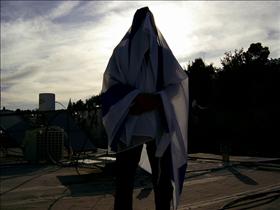There's more than one way to be Jewish
A rapidly growing number of Israelis support Jewish pluralism and equality in Israel
The 2013 Religion and State Index look at the standing of Reform and Conservative Judaism in Israel for the first time. The results were surprisingly optimistic and show that more and more Israelis see the need to recognize all major Jewish denominations.
10/09/2013 11:38
Tags: Religion and State Index · Reform Judaism · Conservative Judaism · freedom of marriage · conversion · Chief Rabbinate

Secular prayer: zeeweez flickr
For the first time in the five years of the Religion and State Index, respondents were asked about Reform and Conservative Judaism in Israel. The results were surprisingly optimistic and suggest that there is a rise in support for multi-denominational recognition in Israel. If in the past it seemed that Reform and Conservative Judaism were not well-received in Israel, the Index suggests that today there is a growing awareness of the need for equal recognition. In the past, the statement: "The synagogue that secular Jews don't go to is Orthodox" was considered to be the status-quo, but in critical areas, such as marriage, conversion, and rabbinic preference, many Israeli Jews expressed support for non-Orthodox alternatives. Also surprisingly, this trend is not limited to secular or liberal Israelis; 56% of voters from the traditionally Modern Orthodox party, Habayit Hayehudi, support equal recognition of rabbis from all major Jewish denominations.
Marriage
62% of Israeli Jews are in favor of legal recognition of all types of marriage ceremonies, including Reform, Conservative, and civil. Since the 2010 Index, support for civil marriage has stabilized around 60%. Interestingly, 23% of Modern Orthodox Israelis and 52% of Habayit Hayehudi voters support recognition of non-Orthodox marriage ceremonies. 61% of Likud Beiteinu voters, 88% of Yesh Atid voters, and 91% of Labor Party voters support equal marriage recognition. On the other hand, 90% of those who voted for ultra-Orthodox parties oppose legal recognition of non-Orthodox marriage ceremonies.
Two-thirds of Secular Israelis (67%) would choose a non-Orthodox ceremony for themselves or their children and only 33% would choose an Orthodox halachic ceremony. Out of those two-thirds, 39% would choose civil marriage, 20% would choose Reform or Conservative marriage, and 8% would choose partnership without marriage. Almost identical results are present among Israel's immigrant population (37% would choose an Orthodox marriage ceremony). 64% of Yesh Atid voters, 63% of Labor Party voters, and 80% of Meretz, Hatnuah, and Kadima voters would choose a non-Orthodox wedding for themselves or their children. 64% of Likud Beteinu and 90% of Habayit Hayehudi voters would choose an Orthodox marriage ceremony.
If in the past it seemed that Reform and Conservative Judaism were not well-received in Israel, the Index suggests that today there is a growing awareness of the need for equal recognition.
Conversion
61% of Israeli Jews favor legal recognition of every type of conversion that is currently practiced. This result has been consistent since the first index. Of the 61% in favor, more than one-third (36%) support a secular conversion (Jewish study and a ceremony for joining the Jewish people in a non-religious process), compared to 30% in the past two indices. This finding especially stands out since there is no secular conversion in Israel today. It is even rare to see such a ceremony in the United States.
Recognition for Reform and Conservative rabbis
Two-thirds of Israeli Jews (67%) believe rabbis from all major Jewish denominations should have equal standing. Only 33% believe in the continuation of the Chief Rabbinate's strict Orthodox monopoly on Judaism in Israel. The question asked was: "The Chief Rabbinate and rabbinic courts, which represent Orthodox Judaism, enjoy exclusive authority in marriage, divorce, and in other areas. Do you believe that this standing is legitimate or that all major Jewish denominations should be recognized?" Among those who support equal recognition were 89% of Secular Israelis, 66% of traditional Israeli Jews, 84% of immigrants, and 26% of Modern Orthodox Israelis.
The rise in support for non-Orthodox Judaism comes hand-in-hand with public resentment towards the Orthodox Chief Rabbinate's monopoly on Judaism in Israel. 70% of Israeli Jews oppose the current model of the Chief Rabbinate compared to the 63% that opposed the Chief Rabbinate's current form in 2009. Of those opposed, 40% favor one Chief Rabbi and 30% are in favor in stopping state funding for all rabbis. This was a significant rise from 17% in 2009 to 30% in 2013. This could be attributed to the influence following one of the dirtiest campaigns for the Chief Rabbinate that took place in 2013.
Click here to read more findings from the 2013 Religion and State Index